Day 3 -- Reading to Oxford

Route for day 3

Elevation profile for day 3
Our luck with the weather ran out. It was pouring rain, and it looked like an all-day rain when we set off from Reading. Nothing for it but to pretend the rain didn't exist. The "breadcrumbs" on our GPSs led us easily out of Reading as we cycled on sidewalks past many pedestrians with umbrellas. We crossed the river and started up a steep hill out of town, then off on a side road and onto a bike path through wet foliage.
We cycled on the path up a hill past a golf course, passing on the way several young girls riding horses. We saw many people riding horses along the trails, and they were always young girls. On the other hand, let me say again that we saw no other cyclists.
Presently we left the off-road path and cycled on a country road through heavy rain. We stopped to admire an isolated church and graveyard. In this dank and dreary morning, there was a certain atmosphere about the scene -- perhaps more proper than if it had been a sunny day.
We now cycled through dripping forests. As you can see from the elevation profile above, we were on a steep hill. Under the trees it was raining harder than in the open, and the morning was very dark.
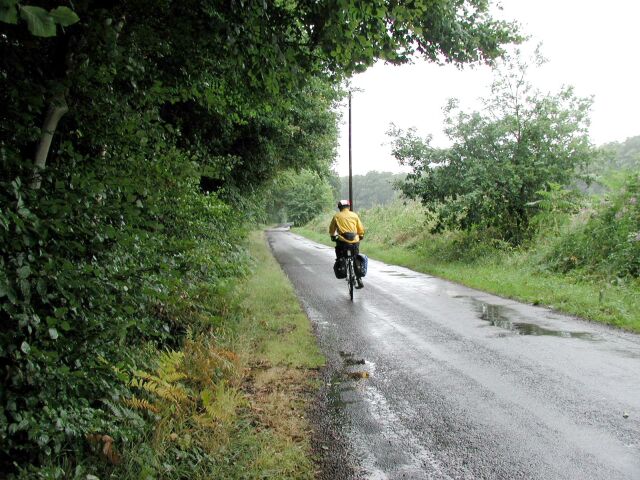
A country road in the rain
In the dark trees it looked very much like some prehistoric rain forest. I could imagine the ominous "thump" of some large creature shaking the earth as it stepped forward.
We finally crested the top of the hill and came out of the forest at 630 feet elevation. There was some tough going towards the end of this climb. At the top we were greeted by the friendly sight of one of those British Telecom phone booths, as well as the usual quaint English road sign.
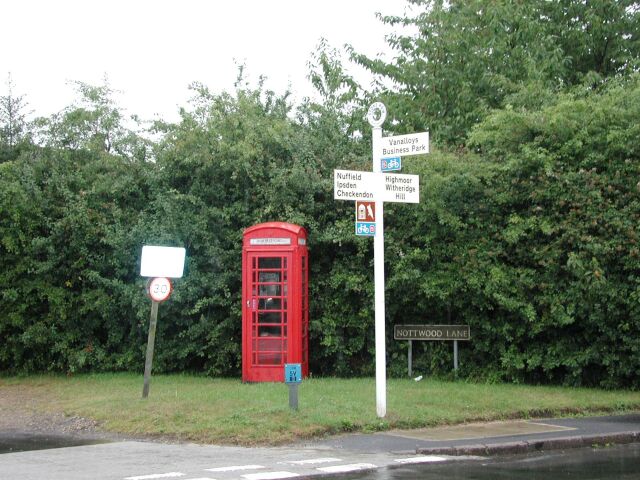
Familiar sight in rural England
We rode down a small highway and turned, following the GPS and the national cycle path signs. However, we missed the next turn, which was obscurely marked, and we rode on for almost a mile before realizing that we were losing the "breadcrumbs" (track) on our GPSs. We huddled underneath a bus alcove and argued about directions, finally turning back and finding the missed turn. This time I saw the small sign for the cycle path. How was anyone supposed to see it, I wondered?
Shortly thereafter we came to one of those decision points where the cycle path signs said to go one way, and the GPS tracks (based on the Sustrans map) said to go another way. This happened a number of times during the trip, and each time we decided to follow the GPS. Otherwise, we argued, we would lose the benefit of the tracks on the GPS. Every time we followed the tracks on such occasions, we later reconnected with the cycle path. As we did this time.
The rain was letting up a little as we came out into the open on farm roads. There was a panorama of wheat fields all around us, and we paused to absorb the vast, empty scenery. We had the road to ourselves this rainy morning.
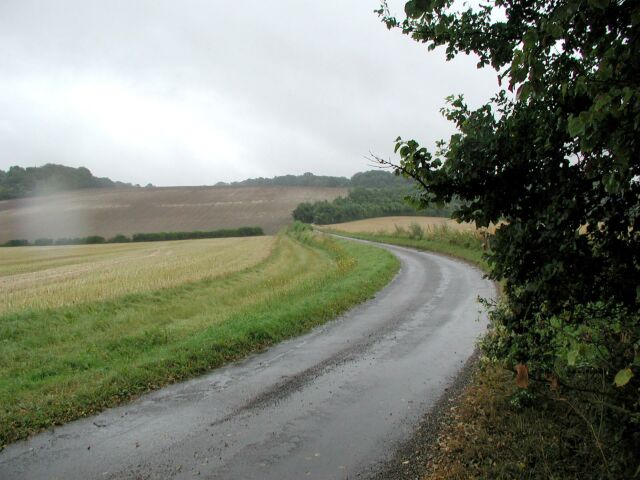
Empty roads through wheat fields
It was getting late for lunch when we came into the first significant town of the day, Wallingford. We were coming down the main street of Wallingford when I decided to cut up on the sidewalk, rather than cycle on the narrow street in the rain and traffic. It was a vertical curb, but I thought the wheel would hop on the curb ok. It didn't. I was thrown off the bike, and I took a swan dive onto the grass at the side of the road. The only thing hurt was my ego. I was already so wet that rolling grass and mud had no visible effect.
We were ready for a real sit-down lunch to get out of the rain, and we looked for some attractive place. We settled instead for a little luncheonette, but it really was rather nice. We slopped into seats, dripping wet, and sliding out of our rain gear. People stared at us. I had a moment of complete panic when I opened my handlebar bag and didn't see my wallet. But it was in my jacket pocket, and I heaved a big sigh of relief. However, now that my handlebar bag was open I checked for my other valuables -- my passport and airline tickets. They were there all right, but soaking wet. The passport was all crinkled up and soaked. The ink appeared to running on my airline tickets. I had assumed that the handlebar bag was waterproof, but obviously it wasn't. I was debating what to do to bring them back to life, and I said to Len that maybe I could iron my passport. He didn't think that was a good idea. Anyway, there wasn't an iron in my room that night. On another night I put the passport in a pants press, and that seemed to help a lot.
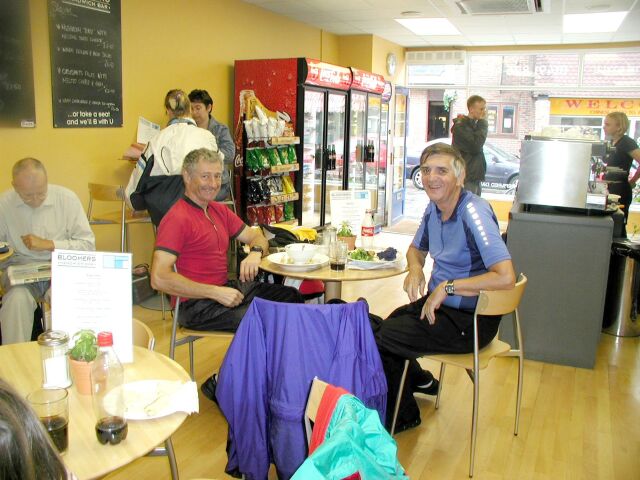
Sanctuary for lunch out of the rain
After lunch we hit the roads again, and now the scenery had a different character. Gone were the empty wheat fields and expansive views. Instead we were passing through small semi-connected villages with our first thatched roof houses. We debated why thatched roofs were good, and couldn't decide. We wondered what small animals lived inside, and what the effect of rain would be. We didn't have any answers to those questions. Still don't.
Once again we got to off-road cycle paths. This time they were flat and through rather empty scenery. In the distance we could see the ominous towers of a nuclear power plant. Cars whizzed by, and Len cracked that they wanted to get away from here as fast as possible. Fortunately, we weren't going anywhere near the plant ourselves, as we were running parallel to them and quite a long way away.
Gradually our path curved around and entered the town of Didcot. The map said it was famous for its railroad museum, but of course we didn't stop to see that. The nuclear power plant now seemed a lot closer. We continued to peddle through the rain, and the nuclear towers continued to come closer. We weren't really going to go near them, were we? But there they were, now directly in front of us. The cycle path looked like it was going to go right into the big chimineys.
The last thing we saw before we went right under the shadow of the chimineys was a spring water plant, the Thames Valley Water Company. As we passed by, Len cracked back to me that we should never buy that kind of water. Obviously it would be irradiated. There was a man standing outside the plant smoking a cigarette, and he heard Len's crack. He smiled, so I guess it was all right.
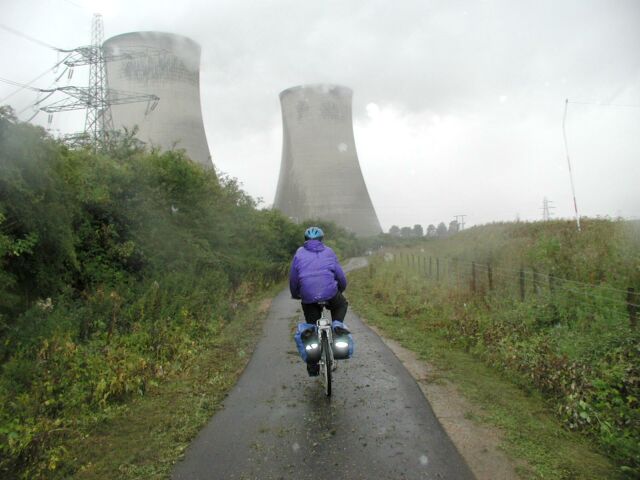
We're not really going to go near the nuclear plant, are we?
A strange thing happened. You can see how rainy and misty it is right here by the plant. But almost as soon as we had passed the plant, the day began to clear for the first time. It was still raining, but ever more lightly as we approached the pretty town of Abingdon.
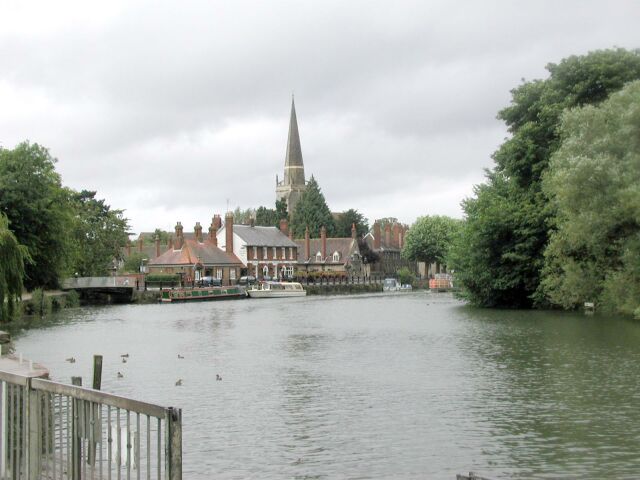
Coming in to Abingdon
By the river Abingdon was quite lovely, but turning away from the river we ran into a lot of traffic. The Sustrans route took us down a main street, looped back through a couple of traffic lights, turned, and turned again through heavy traffic and difficult crossings. After completing this near-circle, we were only a block from where we had been earlier. Apparently, the Sustrans route takes you around a half-mile or so of traffic to avoid walking the wrong way for a block up a one-way street. If we had known, it would have been a lot easier to walk our bikes for that block.
On the outskirts of Abingdon was the Abbey Close and an attractive flower garden with tropical-looking plants
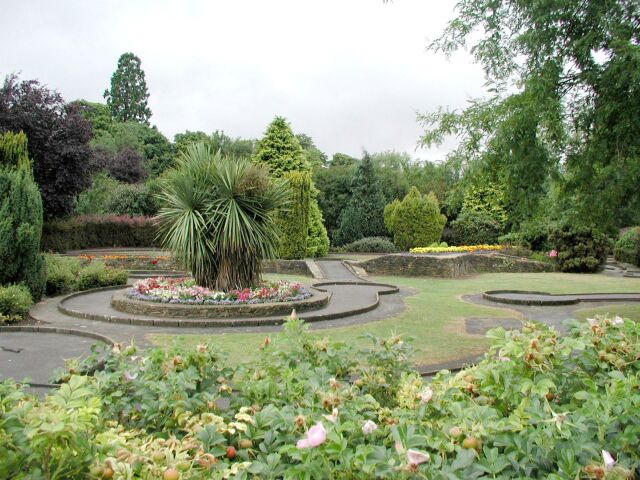
The Abbey Close, Abingdon
We rode along a quaint bike path a little ways from here, and over wooden bridges. Here the sun shone on one of the special commemorative mileposts marking the national cycle path. There are about a thousand of these signs distributed throughout the UK, and you're supposed to take rubbings of them. If you collect enough rubbings, you get a free t-shirt or something like that. I thought the signs were very nice, but I never took any rubbings.
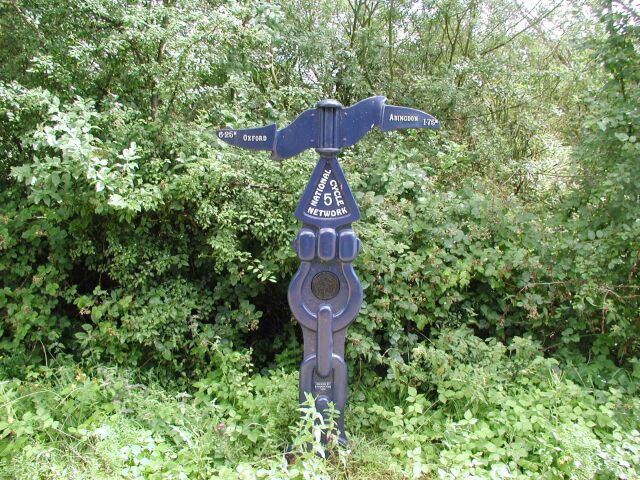
Commemorative milepost on the national cycle path
Presently we came out on a highway towards Oxford. There was moderate traffic on the road, but we were able to ride on a cycle lane alongside the road. Approaching Oxford, I had plotted on the GPS a way to get into the center of town on a traffic-free path along the Thames. There was a sign to turn off onto a path for the national cycleway, but our GPS tracks didn't turn there. So we went along a little further and got to the Thames itself. (We were told that in Oxford it's called the Isis.) There was a little muddy path running along the river and past a lock. We started along the path, only to be stopped by the locksman.
The locksman told us that after we walked our bikes past his lock, that we could cycle into town along the path. While I was glad to have this assurance, the path didn't look very negotiable to me. Soon we were cutting our way through what seemed like a rain forest. I felt like I should have been out front with a machete, hacking away.
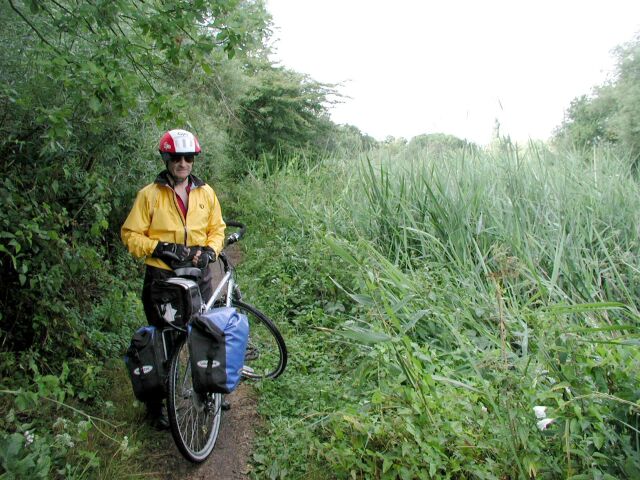
Did we make a wrong turn somewhere?
This was rough going. It was wet and slippery, and we kept getting brushed by stick-ums along the path. Sometimes we had to cycle across wet fields where there was no path at all. I kept thinking about going back and retracing our route to that other turn, but we had invested too much now to return. We forged ahead, running into many dogs, walkers, and runners. There also was a quite a bit of boat traffic.
Somehow we got to central Oxford, and from there followed a number of devious turns, led by the GPS routing directly to our hotel. We looked pretty awful checking in. We were wet and muddy, and our bikes were covered with mud. Nonetheless, as everywhere we went, the people at the hotel were welcoming and gracious.
That evening we met the son of a mutual friend, who was taking a summer course at Oxford. We were going to meet at our hotel, but he couldn't find it, so we went to meet him on a street corner. As we walked there, we were shocked to see walking towards us his father, who had flown in just to have dinner with us! And indeed, we did have a wonderful meal. After two nights of eating last minute dinners in our hotels, this was a special treat.
I asked the son what he was studying at Oxford and he said, "Rhetorics." Then I inquired what one learned in a course on rhetorics. "You must stand tall and speak in a loud voice," he replied. Somehow I missed this when I was in college.
Proceed to next day's cycling -- Oxford to Banbury